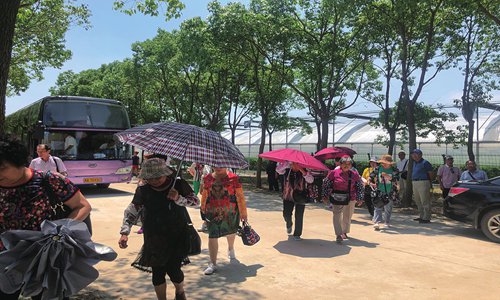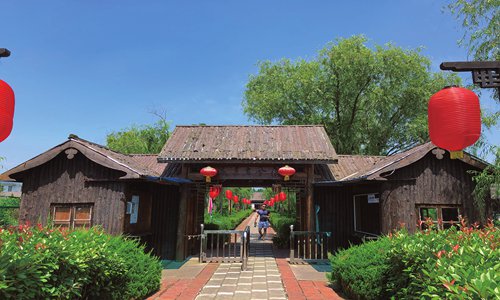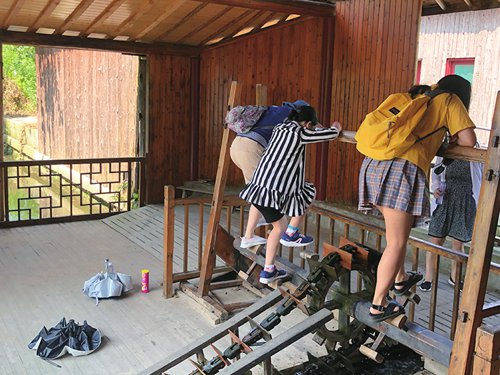HOME >> BUSINESS,METRO SHANGHAI
How does peasant-household tourism benefit both villagers and urban travelers?
By Wang Han Source:Global Times Published: 2019/7/10 18:23:41
City escape
A bus stopped in the farmland of Qianwei ecological village in Chongming district in Shanghai. Then dozens of middle-aged and elderly individuals got off the bus and headed toward vendors that sell organic fruits and vegetables.
"How much is the watermelon?" "Can I taste your tomatoes?" were some of the conversation starters between the vendors and tourists that lasted over 10 minutes.
Zhang Ailian (pseudonym), a 50-something tourist in the group, was eating a piece of watermelon at a stall. She told the Global Times that shopping is actually part of the agenda during their Chongming district tour.
"Watermelons planted in Chongming district taste much fresher than those sold in supermarkets in [downtown] Shanghai. The vegetables and fruits here are free from pesticides, so I decided to buy some and bring them back home," Zhang said, adding that she and most members in her tourist group are from urban Shanghai.

A popular tourist destination
Over the past few years, the development of the tourism industry in Chongming district has made the district a popular tourist destination for people in nearby regions.
Li Zhuang (pseudonym), an electronic sightseeing vehicle driver at Qianwei ecological village, told the Global Times that the place where the tourists shop for vegetables and fruits is called the Rose Garden.
"At the Rose Garden, one can not only see roses, but also seasonal fruits and vegetables. Tourists can come to the garden to pick seasonal fruits such as strawberries and tomatoes as a leisurely activity," he said.
Li added the Rose Garden is still under construction, and in the near future, there will be more entertainment infrastructures, including a man-made beach.
According to the Chongming Tourism Bureau, the tourism industry in the district has been continuously growing in recent years. The district received over 5.76 million tourists in 2017, which generated around 1.2 billion yuan ($174.29 million), the Shanghai Observer reported in April 2018.
The highlights of tourist attractions in Chongming district include nature reserves and parks, such as Dongping National Forest Park, Chongming Dongtan National Nature Reserve, and Xisha Wetland Park. Peasant-household tourism which allows travelers to experience local delicacies and countryside activities is also booming in the district.
Mao Qin, 40-something, is operating a happy farmhouse business with her husband and father in Qianwei ecological village. Her four-story farmhouse has 16 rooms for accommodation, two spacious rooms for dining, several rooms for playing mahjong and cards, and one big room for singing karaoke.
"My parents started to run the happy farmhouse business around 2000. I took the business from them in 2007," Mao told the Global Times.
She said her family business was already on the right track when she took over, and the scale was much larger compared with the start-up stage. But being from a younger generation of operators, Mao and her husband realized the importance of the internet to promote the family business.
"Around 2007, we started to post pictures and information of our rooms online. After being exposed online for around six months, the number of our clients soon increased. We received more and more calls about our services," she told the Global Times.

One-stop service
Yan Ming, 20-something, stayed in Mao's accommodation. She said she came here with her colleagues for team building.
"The room condition is not as ideal as those at economical hotels downtown, but the price is really cheap," Yan told the Global Times. "Living at the inn for one night, and eating four meals at the inn only costs around 200 yuan."
One-stop service is a selling point of the village's happy farmhouse business. "A 280 yuan package per person covers the fees of many services, including a one-night accommodation, four meals, and tickets to three tourist spots," Mao said.
The peasant-household business at her village was initiated by the village administrators, according to Mao. "At first only a dozen families were willing to join the program. My parents were among them," she added.
She pointed out that the tourism business in her village witnessed a big improvement after 2009, which was the same year that the bridge that connects downtown Shanghai to Chongming Island was officially opened.
"Previously, travelers in [downtown] Shanghai had to take boats to Chongming Island," Mao said. "Since 2009 we have seen a growing number of tourist groups, company staff and individual travelers coming here for team building, traveling or family gatherings."
Mao said there are over 100 independent happy farmhouses in her village, but only a dozen of them are the same size as her farmhouse business. "I am also collaborating with 10 smaller farmhouses. When there was no room in my inn for travelers, I would arrange my clients to live in other farmhouses. But they don't provide meals or entertainment services like us," she added.
Mao said the busiest time for her business is during statutory holidays, such as the Spring Festival holiday, the National Day holiday and the May Day holiday, as well as weekends. "April and May are the busiest months, but July and August are the slowest months, as the weather is too hot in the district," she said.

"How much is the watermelon?" "Can I taste your tomatoes?" were some of the conversation starters between the vendors and tourists that lasted over 10 minutes.
Zhang Ailian (pseudonym), a 50-something tourist in the group, was eating a piece of watermelon at a stall. She told the Global Times that shopping is actually part of the agenda during their Chongming district tour.
"Watermelons planted in Chongming district taste much fresher than those sold in supermarkets in [downtown] Shanghai. The vegetables and fruits here are free from pesticides, so I decided to buy some and bring them back home," Zhang said, adding that she and most members in her tourist group are from urban Shanghai.

Tourists shop for vegetables and fruits at the Rose Garden. Photo: Wang Han/GT
A popular tourist destination
Over the past few years, the development of the tourism industry in Chongming district has made the district a popular tourist destination for people in nearby regions.
Li Zhuang (pseudonym), an electronic sightseeing vehicle driver at Qianwei ecological village, told the Global Times that the place where the tourists shop for vegetables and fruits is called the Rose Garden.
"At the Rose Garden, one can not only see roses, but also seasonal fruits and vegetables. Tourists can come to the garden to pick seasonal fruits such as strawberries and tomatoes as a leisurely activity," he said.
Li added the Rose Garden is still under construction, and in the near future, there will be more entertainment infrastructures, including a man-made beach.
According to the Chongming Tourism Bureau, the tourism industry in the district has been continuously growing in recent years. The district received over 5.76 million tourists in 2017, which generated around 1.2 billion yuan ($174.29 million), the Shanghai Observer reported in April 2018.
The highlights of tourist attractions in Chongming district include nature reserves and parks, such as Dongping National Forest Park, Chongming Dongtan National Nature Reserve, and Xisha Wetland Park. Peasant-household tourism which allows travelers to experience local delicacies and countryside activities is also booming in the district.
Mao Qin, 40-something, is operating a happy farmhouse business with her husband and father in Qianwei ecological village. Her four-story farmhouse has 16 rooms for accommodation, two spacious rooms for dining, several rooms for playing mahjong and cards, and one big room for singing karaoke.
"My parents started to run the happy farmhouse business around 2000. I took the business from them in 2007," Mao told the Global Times.
She said her family business was already on the right track when she took over, and the scale was much larger compared with the start-up stage. But being from a younger generation of operators, Mao and her husband realized the importance of the internet to promote the family business.
"Around 2007, we started to post pictures and information of our rooms online. After being exposed online for around six months, the number of our clients soon increased. We received more and more calls about our services," she told the Global Times.

A tourist spot in Qianwei ecological village in Chongming distrct Photo: Wang Han/GT
One-stop service
Yan Ming, 20-something, stayed in Mao's accommodation. She said she came here with her colleagues for team building.
"The room condition is not as ideal as those at economical hotels downtown, but the price is really cheap," Yan told the Global Times. "Living at the inn for one night, and eating four meals at the inn only costs around 200 yuan."
One-stop service is a selling point of the village's happy farmhouse business. "A 280 yuan package per person covers the fees of many services, including a one-night accommodation, four meals, and tickets to three tourist spots," Mao said.
The peasant-household business at her village was initiated by the village administrators, according to Mao. "At first only a dozen families were willing to join the program. My parents were among them," she added.
She pointed out that the tourism business in her village witnessed a big improvement after 2009, which was the same year that the bridge that connects downtown Shanghai to Chongming Island was officially opened.
"Previously, travelers in [downtown] Shanghai had to take boats to Chongming Island," Mao said. "Since 2009 we have seen a growing number of tourist groups, company staff and individual travelers coming here for team building, traveling or family gatherings."
Mao said there are over 100 independent happy farmhouses in her village, but only a dozen of them are the same size as her farmhouse business. "I am also collaborating with 10 smaller farmhouses. When there was no room in my inn for travelers, I would arrange my clients to live in other farmhouses. But they don't provide meals or entertainment services like us," she added.
Mao said the busiest time for her business is during statutory holidays, such as the Spring Festival holiday, the National Day holiday and the May Day holiday, as well as weekends. "April and May are the busiest months, but July and August are the slowest months, as the weather is too hot in the district," she said.

Tourists try a waterwheel at a tourist spot. Photo: Wang Han/GT
Posted in: INSIGHT,METRO SHANGHAI